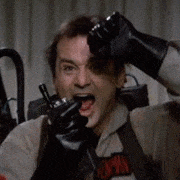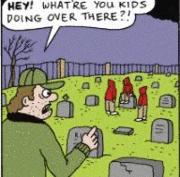|
CantDecideOnAName posted:All 200+ pages of it? If you're going to be obtuse, don't bother. The kind people of CC offer critiquing services in exchange for you doing the same, and so long as everyone follows the established politeness protocols, the big wheel keeps turning. As stated before, if you have a section of prose that is less then 500 words, it goes in the Farm, else it gets its own thread. Threads for longer works typically consist of single chapters being posted to work on, or failing that, around 5000 words. The good part is that these lovely people can help you work that 200 pages down to about 100 pages, making it a much more manageable project for you.
|
|
|
|

|
| # ? Apr 19, 2024 23:16 |
|
My apologies. I'm just very frustrated with this entire thing. I've never been a particularly nitpicky reader, so I'll refrain from imposing on everyone asking a favor I'm not good enough to return.
|
|
|
|
CantDecideOnAName posted:My apologies. I'm just very frustrated with this entire thing. Everyone gets frustrated with their writing efforts. It's normal. Buck yourself up and plough through it. Thinking you're poo poo means you're looking hard at yourself with an eye to improve, and that's a good thing. However, your second paragraph is bordering on the passive aggressive. Do not derail this thread with a pity party. If you do, I will ask pipes! to give you a nice vacation so you can take the time to sit down, sort your poo poo, and write something. Go away from your computer and don't post again in this thread tonight. Do not apologize. Do not explain. We all know what you're going through at this exact moment. Come back after you've refreshed your brain. You'll feel better for not having made more of an rear end of yourself. Play around in the Daily Writing thread and get your chops, man. If you give up, we can't help you. We can if you keep at it. Stuporstar fucked around with this message at 07:03 on Jul 26, 2012 |
|
|
|
Jonked posted:Didn't see this asked in the first or last three pages. I'm looking into selling some of my fiction to journals and magazines. What's the proper way to shop around when I'm trying to sell a piece? Is it like interviewing for a job, where you send it to everybody and they assume you're looking at more than one place? Or is it more like dating, where you wait to be rejected or accepted one at a time, and for god's sake don't mention who else you're looking at? Thought I'd drop some bombs and lay some raps while wearing a backwards hat with this cross-thread reply. How to Assist in Killing Mother Earth by Tricking a Magazine into Publishing Your Drivel So, some of you have big dreams of being the next Hunter S. Thompson or Ernest Hemingway. I sincerely hope that comes true for each and every one of you in the near future--at least their last 30 minutes. To accomplish your dream (and eventually mine), you need to begin the long and painful journey of acquiring pub creds [publishing credits]. Does self-publishing on Amazon or anywhere else count as a pub cred? No. It does not. More on that later. Let's take a look at a roadmap to success for a fiction writer that I'll go deeper into afterward: 1) Decide you like reading books and would like to try writing them. 2) Read a lot with discretion. Start from the top of the "best of the best" in literature and work your way down to lovely dime novels you'd find in the bargain bin. Too many people do the reverse and only read whatever they happened to like as kids. 3) Write short stories. Many people start out with novels because they want to skip right to the rich and famous novelist part. If you can't manage to write a decent short, how can you expect to write a whole novel that isn't poo poo? It's like assuming you can perform surgery before learning anatomy. I'll squash the poo poo argument about "needing more room for big ideas" right now: if you can't do a proper short, you're a poo poo writer. 4) Edit your short stories. Hemingway wasn't lying when he said, "The first draft of anything is poo poo." Painfully going line by line as you write is still likely to produce a lovely first draft, so you might as well bang it out and make it good in the editing. I don't care if you consider yourself a "perfectionist" snowflake. You're an annoying idiot and the worst type of person to try to work with. 5) Submit to reputable journals that people actually read. 6) Get rejected. 7) Cry about it while you write more stories and edit them. 8) Submit some more. 9) Get rejected more. ... 273) Cry, write, edit, submit, get rejected. 274) Someone takes pity on you and you actually publish something. There's plenty of people that want to fill your head with pretty ideals that you should write whatever you want and eventually you'll be discovered. Those people were probably your friends and family (who are likely to support you even if you suck) and your teachers, people paid to make sure you feel good about your chances at a writing career and keep whoever is paying for your education tossing out that tuition money, you tosser, you. The truth of the matter is that it's a skill. Writing is a job that anyone who is literate can learn to do. That skill requires practice. Monkey see, monkey do. You read what other contemporary (stress on the contemporary) writers are publishing, and you assimilate what they've done well into your own work. While it's romantic to think of yourself as the artsy reclusive writer, it's just wrong. Writing is inherently a super-social activity. It is literally communicating with other people. To write convincing characters, you have to be social and know how people actually act. To write interesting situations, you have to have led an interesting life to draw on. If you suck at being social, you'll suck at writing. So, sorry to those of you who are the quiet and shy type looking to break out into the world with your genius fantasy/sci-fi/whatever novel. If you're writing stuff nobody wants to read, it's like walking up to a group of people at a party having a conversation and launching into a screed about your favorite anime while staring at your toes. You can just gently caress off to your weird little hobbit hole and cry about how nobody understands your work. If publishers don't want to see your poo poo, it's because people probably don't want to see it. There's not a big market for masons who only make houses in the shape of dicks either. So, what do you do? First, let's look at self-publishing. It was more aptly named in the past as "Vanity Publishing". For the most part, it's an excuse. Unless you're writing something in line with the Marquis de Sade as his work was received at the time, there's usually a good reason publishers wouldn't want anything to do with you. Probably because what you've sent to them isn't within the realm of stuff they publish or your prose sucks. Most people don't have time to crawl through hundreds of thousands of people trying to spew out half-assed novels even if they only cost a dollar. Publishers act as the gate keepers for the general public, so you'll at least be reading something that isn't total poo poo even if it's not any good. Stephanie Meyer is a favored whipping-girl, but at least some professional editors took a crack at making it readable before it hit the shelves. Imagine if she self-published it. Having someone else publish it, electronic or print, tells your reader that it has met a minimum standard, however low that might be. It's necessary to building a career even if there is a remote chance you could be a one-hit wonder self publisher. If it's actually any good, someone will pick it up. If it's not good, you should be busy trying to make it good through editing until someone does. It's vanity publishing because you want to call yourself a published author and not because you've put in the effort to make sure it's a well presented and crafted story that other people want to read. So, how do we get published? I'm going to assume you're going to want to write and publish novels. First, you should start with short stories. Why? Because they're short, there's a market for it, and it teaches you a whole hell of a lot. A good short story can translate into cash in your pocket, a very valuable publishing cred, and a sense of satisfaction that you don't suck. Once you've built up some publishing creds, agents are willing to look at you because you've been vetted. People obviously want to print you, so they're taking less of a risk taking you on. Once you have a reputable agent and a stack of publishing creds, their job is much easier in convincing a publisher to give you a run on your novel. That's how the system works. To get those publishing creds, you have to do a lot of leg-work, which is why many people turn to vanity publishing for instant gratification. The good news is that once you get your first, the next is easier, and it only gets easier to acquire more as you go along. A good place to start looking is duotrope.com. It makes your life much easier in that you don't have to crawl through multiple editions of Writer's Market. That's where you should start looking for magazines to submit to. To increase your chances of success, do a little background check into each magazine. Subscribe to a few that look good and see what they publish. Also, don't make the mistake of only submitting to the biggest, baddest journals with the highest pay. Ego gets in the way for a lot of people, and they think they can only publish in the New Yorker, Glimmertrain, or Gud because they're special. The reality is that the pub creds from little magazines add up, and they're just like the major book publishers, and they want to see a nice scroll of credits before they take you seriously. Check out the little, newer mags. They publish good stuff as well because they have to build their reputation by publishing people with talent. A good new writer and a good new mag go hand in hand because they need each other, and when you go on to publish in one of the big boys, it makes them look good. Here's the situation: you wrote a story, and you've edited it a bunch. What do you do with it? Well, you send it out to multiple mags. Response times can range anywhere from a couple days to months, so you better have your hand in as many pots as possible. Referring to the question posed by Jonked regarding simultaneous submissions, I usually laugh that part off. While it's absolutely important to follow the guidelines of a magazine when submitting (or they'll not even read the first line before they trash it), that's one I ignore. There's two reasons. The first is that it's an incredibly good problem to have, and it's far more likely you will have a huge stack of rejections unless you're name-brand to them, so it'd be a non-issue. Second, who is going to know? If you have a choice between two magazines, you can choose to pick the one that says "no sim-subs" and email the others that you've placed it somewhere else, or you can choose the more prestigious/higher paying mag and let the no sim-sub cry about it. Chances are, they won't even remember you the next time you submit to them, and if they write your name in their little black book of hate, it's not like there aren't literally hundreds of other mags out there. You've got a story, you've picked out 7 places to submit to this week (if you're being lazy about it... seriously, you have to submit constantly to get anywhere), and you've tailored each copy of your story to fit the guidelines of those magazines (extremely important). Let's talk about cover letters. It should look something like this: Hello [Editor's name] Thank you for considering [title of story]. My work has previously been published in: [pub cred] [pub cred] [pub cred] Regards, [Your Name] And that's it. Unless they specify that you should add stuff, you shouldn't. They're interested in seeing where you've been published, and that's about it. Using the editor's name is a nice touch because it shows you at least visited the website and checked out the magazine before dropping a turd in their lap. Now, you'll continue to do this in perpetuity. You can enter contests if you like, using your pub creds as weight (no, life isn't fair), and placing in those will be a really good cred for you along with some cash, probably. The whole time you're submitting, you should be writing and editing your rear end off. Maybe work on your novel on the side, but it's going to be hell trying to get it published if no one knows who you are. It's best to rack up those credits for short stories so you can get more, learn more, and get ready to tackle a novel. Once you've got a bunch of creds, you submit a portion of a novel to an agent (with much the same cover letter except you'd also attach a one-page summary treatment of it). Then, they take over the work of pushing your novel onto publishers and possibly your short stories onto magazines, thus earning their percentage. That's how you tackle becoming a professional writer no matter if it's poetry, fiction, or freelance: you treat it like it's your job and put that many hours into it.
|
|
|
|
Ever wonder if your short story or opening chapter has real "hook"? Here's how to test: Go to http://omegle.com/ Paste the opening line Wait a few seconds, paste the next line. Wait a few more seconds, and paste the rest of the opening paragraph. If you can elicit an "and then...?" from a decent ratio of mostly randy american teenagers, chances are you have a good opening. Or you at least write good YA Fiction.
|
|
|
|
Has anyone here had experience writing "historical" fiction that is still set within living memory? The project I'm working on right now is set before I was born, but still well within living memory (i.e. millions of people alive today lived through that time period.) I'm obsessively well-researched, but, well, sometimes I feel like a fraud for writing about something I could never have experienced. I get the sense that I can consume as many firsthand accounts, historical documents, nonfiction books, media and ephemera from the time as I possibly can but I'll still always lack something that those who were alive then would not. Any thoughts on this?
|
|
|
|
squeegee posted:Has anyone here had experience writing "historical" fiction that is still set within living memory? The project I'm working on right now is set before I was born, but still well within living memory (i.e. millions of people alive today lived through that time period.) I'm obsessively well-researched, but, well, sometimes I feel like a fraud for writing about something I could never have experienced. I get the sense that I can consume as many firsthand accounts, historical documents, nonfiction books, media and ephemera from the time as I possibly can but I'll still always lack something that those who were alive then would not. Any thoughts on this? First off, what's the event you're talking about? Also, what's your personal connection to it? Meaning what's a life experience of yours that applies to the event and/or how characters feel. Writing what you know doesn't mean to write just what happened in your life. It means to apply the events of your own life to the cast and scene, so it doesn't matter if you weren't alive to experience it.
|
|
|
|
Nautatrol Rx posted:First off, what's the event you're talking about? I'm not actually talking about any specific event-- I guess I should have specified that I put "historical" in quotes because while the setting/time period of the novel takes place in the past, it's not the main focus or driving point of the story. However, it is essential to the story in the sense that it would not be the same if set in any other period. The time period ranges from the mid/late 1950s to the mid/late 1960s, which was obviously a historically important time in America. I understand that "write what you know" doesn't apply to only what someone has literally experienced, or most fiction would be pretty drat boring. I do, in a sense, know it as I'm well versed in the various social, economic, political, etc. realities of the time, but I worry that the project lacks a certain characteristic "feel" that could be more easily captured by those who lived through the era. I can explain in an intellectual sense all the factors that contributed to this particular "feel" but I don't know that I can accurately represent it-- if that makes any sense.
|
|
|
|
Well, as simplistic as this answer may sound at face value, there's a little more to it: the feel comes down to the tone. When I think 50's and 60's, I think of the cultural upheaval, questionable scientific experiments, and war. That's just the surface, though. A piece that tries to be everything to everyone, meaning to encapsulate several points of view on the era, is going to read more like an encyclopedia entry than an entertaining story. There really is no "feel" to an era--just loose groupings of interpretations. I had a neighbor who was an adult in the 50's, and his take on the era was "it was cool to shoot me some gooks." I've also known people who were social and war protesters who had their own take. To some, the era was entirely different, and they remember the rise of stereo, The Ventures, and reading about all this change in the news. So, if you're wanting to try to replicate their feelings, you may be SOL. They can and have written about it. What's interesting, and the way you should approach it, is recreating how you feel about it. Rather than try to recapture how the beat generation saw themselves at that time, tell us what you think of them. Create your own "feel" without giving a single thought to what you think is an accurate representation. As I said before, they've already spoken for themselves on that, and trying to add to it will just come off as aping. Accomplishing that is really simple but sometimes difficult. If it's something you care about, you have to reach down, pull from the gut, and state what you think plainly. That's where I think you're feeling anxious about it if I'm reading what you said right. You seem to be afraid of getting it wrong. Really, there's no way to get it "right" unless you just tell the story through your own lens, don't hedge your bets, and take the lumps if anyone throws them at you.
|
|
|
|
I'm not trying to write about an Everyman in that era or anything; I have well-defined characters that exist as their own entities who just happen to live in this time period. The story isn't about the era, it's about the characters-- but I do want to accurately represent their surroundings as much as possible. I also have a couple hundred pages of varying usability written for this project, so it's not that I'm not writing-- I just have some concerns that I feel I should address before I get any deeper into this thing. I guess what I am talking about is the sense of place (because time really is place, in a sense), similar to writing about a city you've never actually been to but have read about/seen movies about/etc. Someone who has actually lived there is likely to feel its lack of authenticity.
|
|
|
|
Nautatrol Rx, thanks a lot of that big piece of advice. It answers pretty much everything I was a bit confused or unsure about, and it feels good to know that at least I was on the right track. Does any of the advice change if you're focusing on speculative fiction? I assume the same general strategy applies if you're trying to make a living out of it, but I also got the impression that publishers like Baen and Tor are, uh, "willing to take more chances" when accepting novels. Really more of a hypothetical question, since I'm mostly sticking to short stories and novellas at the moment.
|
|
|
|
Jonked posted:Nautatrol Rx, thanks a lot of that big piece of advice. It answers pretty much everything I was a bit confused or unsure about, and it feels good to know that at least I was on the right track. It applies to most everything. With freelance/corporate writing, things change as your cover letter needs to show some balls and be more robust, but in the fiction/poetry realm, it's mostly all the same. I can't speak with any personal authority on "genre fiction" (I hate the false dichotomy that term implies as related to "Literary fiction") since I've been told I have a "Literary" bent (at least according to the last rejection letter). But I'm repeating a lot of advice that I've seen in action with a horror writer, which is arguably a genre that needs more love than fantasy/sci-fi. He whips my rear end up and down the street with his accomplishments, but he's also got ten years on me. My philosophy is that good writing is good writing, and unless you have a "hook" as an author, they expect you to make something that is marketable to a wide audience and can hold up to snuff to reviews from NYT critics used to reading stuffy lit rags. I should probably clarify that there is nothing wrong with working on a novel in the mean time while you work on short stories. It's just that shorts teach you so much in a short span of time that they're not only an art unto themselves--they teach you how to write a proper story from beginning to end, how to write a good chapter that makes people want to read more, and lets you experiment until you find what you actually like writing. My primary sermon boils down to this: fight hard, fight dirty, and gently caress the publishers/police. If you got any talent, you're doing them the favor by agreeing to a publishing contract, and you're just going to get used if you come at it from the other way around.
|
|
|
|
Oh, it's not that I'm opposed to writing a novel. It's just that "I'll write a novel, get published, and be famous" was my strategy the last few times around, and went about as well as you expected (Four time NaNoWriMo failure, hated the novel/writing in general by December). I'm a bit burnt out on grand sweeping epics at the moment, and rather just tell fun little stories. Also they seem faster and easier to sell, which is another big plus. Thanks for answering my dumb question though!
|
|
|
|
Writing NaNo is not a winning strategy if you're trying to get published and be famous. Squeezing out as many words is you can in a short period of time is great if you're trying to break free of a dry spell. But it generally leads to unsalvageable over-written crap that doesn't need to be written. To expand on what Nautatrol Rx said about self-publishing: In my opinion, self-publishing isn't a bad concept per se, but it does lead to complacency, especially nowadays when cliques of self-pub writers get together to promote each other's work on Twitter and give each other fake five star reviews on Amazon. Self-pub isn't about improving your craft as a writer -- it's about learning how to market your material, no matter how dishonest you have to be. The average reader doesn't require a good book, only one that's good enough. If your average reader follows up a recommendation and downloads an ebook with twenty glowing reviews, odds are that reader will be satisfied, even if it makes R.A. Salvatore look like Nabokov. And that's what annoys "serious" writers, the ones who sweat blood and bite their thumbs late into the night. I've networked with over a hundred self-published writers, and out of that lot, I'd say at best two or three are competent authors. Yet I know several others who make enough from Kindle sales that they've quit their day jobs and live comfortably writing full-time. I'm talking writers whose prose and storytelling abilities are worse than most of the stories posted in CC, which is a damnably low standard. Given the uncertain future of the big house publishers (especially in print), self-pub might be a more viable path to financial success. But the hugbox mentality I see among self-pub writers suggests to me that going that route will stunt your growth as a writer and a storyteller unless you're uncommonly driven and self-critical.
|
|
|
|
I know you specified print to make something like the point I'm about to make, but I want to draw a clear and decisive line between electronic vs print publishing and vanity publishing. Electronic publishing is a good thing and a part of our future whether we like it or not. I personally like it. I also derived great joy in seeing a physical product in my hand that had my name on it, but that's just sentimentality rather than the purpose of writing, which is to make money because it's your trade and to say something you want to say while you're at it. E-publishing does not equal vanity publishing, and I don't think there's shame in having a work published only electronically even if it's frowned upon in academic circles. I disagree on the future of self publishing because I strongly believe publishers will adapt. Much like we don't gravitate towards every livejournal or tumblr posted, I don't believe the majority of readers will want to gravitate towards a wasteland of increasing self-indulgent writers. Centrality and pre-vetting is important because consumers want to get the "best bang for their buck". There's certainly enough support from adventurous people crawling through Amazon and the like to make a living, but that's at least not where I want to be. Publishers will adapt, I'd say, because it's a business and always has been. It's absolutely mercenary, which is what drives many people towards self-publishing to get the satisfaction they're denied. It definitely cuts out some good writers who don't like the nature of the business. But it also makes it so you don't have to pay sum upon sum working your way through the heartfelt naruto fanfics to find a decent read. Edit: and I type like a redneck talks, so there's that for what it's worth. Erik Shawn-Bohner fucked around with this message at 19:28 on Jul 26, 2012 |
|
|
|
Nautatrol Rx posted:I don't believe the majority of readers will want to gravitate towards a wasteland of increasing self-indulgent writers. This right here is the only place you and I disagree. I'm probably over-cynical and fed up with how much schlock consumers will purchase. My opinion is that the majority of book readers will buy anything that's marketed to them properly. When the big house publishers inevitably muscle in and crowd everyone out of "indie" (electronic) publishing, I believe that marketing will be the deciding factor, not quality. However, I stand by my statement that self-publishing on Kindle is probably a better route for someone who wants to make money from writing, provided they either know or rapidly learn how to market their work. Since you pointed out the mercenary nature of big publishing -- and I agree they will inevitably figure out their assholes from their elbows eventually when it comes to e-publishing -- I will add the caveat that self-pub is probably the better route for now, but only if you get in on it over the next few years.
|
|
|
|
I honestly wish I'd gotten in on it a year or two ago.
|
|
|
|
squeegee posted:I'm not trying to write about an Everyman in that era or anything; I have well-defined characters that exist as their own entities who just happen to live in this time period. The story isn't about the era, it's about the characters-- but I do want to accurately represent their surroundings as much as possible. I also have a couple hundred pages of varying usability written for this project, so it's not that I'm not writing-- I just have some concerns that I feel I should address before I get any deeper into this thing. I guess what I am talking about is the sense of place (because time really is place, in a sense), similar to writing about a city you've never actually been to but have read about/seen movies about/etc. Someone who has actually lived there is likely to feel its lack of authenticity. Could you possibly be any more vague with this very specific question? Give some more details, post an excerpt. Give everybody something to work with. From the little I can pull out of your circumlocution, you're fretting that old folks will read yer story and be like, "that ain't how it was back in my day, gonna hunt that Window-Washing Implement guy down and beat his durn brains in with m'cane!" There are three (3) ways to handle this. 1. Don't worry about it and write your story as well as you know how. 2. Talk to (or read the work of) some of these geezers to get a sense of what it was like. Nautatrol already pretty much covered this. 3. Write a story set in a different period. Maybe if you can get less vague people can help you out more. Post an example of what you're worried about for comment. Something.
|
|
|
|
I was being vague because I was asking for general thoughts from people who have written about time periods still in living memory. I'm not asking for specific critiques on my specific project; I already have a writing group for that (and some of the people in that group are "geezers" who lived through the 60s.) If no one has had this experience, then no one needs to respond. I just thought I'd tap the population of CC for any thoughts/comments/personal anecdotes that might help me along. Sorry for somehow offending you?
|
|
|
|
The only logical advice to give is to find films, other stories, photos, advertisements, etc. from that time period. If it's within the 20th century it shouldn't be too hard, the internet is a big place.
|
|
|
|
Canadian Surf Club posted:The only logical advice to give is to find films, other stories, photos, advertisements, etc. from that time period. If it's within the 20th century it shouldn't be too hard, the internet is a big place. Yes, I've done that extensively. I was really just asking for other people's experiences with this type of thing. Never mind v
|
|
|
|
I've not written anything set in that kind of time period, but it's an interesting issue. It's probably an insecurity anyone is bound to feel in the position you're in. I think it's possible to use narrative style to displace the focus on authenticity -- and I don't mean writing a 50s pastiche (the opposite, in fact). What I mean is, if the whole piece itself feels artfully constructed, then the referent of the piece (time, place, etc.) takes on less significance. But that's probably not helpful in most cases -- and really I think anyone who's close to a particular era/place/event will always hold deeply subjective views and memories of it which will never align with a particular text, and hence all historical fiction is probably unsatisfying to someone, so there's little you can do except arm yourself with your research, as you have done. Do you have anyone who can give you feedback on specifically the period details? The good thing about it being in living memory is that you can actually speak to people who lived it -- but probably the errors will only be found after the first draft.
|
|
|
|
How important is it to have a "plot" set up from the get-go? I don't necessarily mean plot as in "getting the ball rolling" but having a more or less clear "start -> middle -> ending" thought out, or even something basic as "this is gonna be a murder mystery! The victim is X and the killer is Y". Often I find myself just coming up with new settings, worlds or high-end ideas, fleshing them out if they seem worth it and maybe entually coming up with an interesting character (and crew) to bounce off the setting, or a plot hook/scene that would be interesting to explore. I jot down a first draft of whatever scenes comes to mind and... kinda get bogged down when my inspirational zeal runs out of steam or I realize that I'm getting out on thin ice a chapter or so down the original hook. It's a little like mixing a historian's approach, documenting the world and then jumping into "slice-of-life of Rural Gumbistan"-writing. It's a story about nothing! Not necessarily in that order though, the first couple of times I ran into that problem was what triggered my compulsive world-building to help me fill in the empty spots. It's like having an awesome idea for a scene set in a house... and then realizing that there's nothing outside the front door, so I better fill that in... oh and I need characters too! and something to well, motivate them to... do stuff. It becomes quite overwhelming really, I run out of steam and then a week or two later another idea pops into my head and off I go again. If the previous idea was really good I might just come back to it after 3-6 months, but then it's like going back to a first draft and realizing everything you wrote is kinda rubbish and oh I better fix this part, and this and-  Feels like I need a better approach to this poo poo!
|
|
|
|
Sounds like you need to learn about discovery writers versus outliners. The simplest explanation lies in the terms themselves; a discovery writer discovers his way through the story, only having an idea or a hook to go on. You've been a discovery writer so far, with the world-building parts of an outliner. An outliner world-builds, creates a plan of varying detail, often a one-page summary of the story, and goes from there. The most important thing to know is that both ways are okay. Some people get nothing out of outlines, and some need to have a proper plan or they'll dry up. Some people like to mix it up a bit, write some stories of the bat and some with careful planning. I think you would benefit from trying the outliner approach, just to see if it works better for you. Eventually, you'll settle in a good mood and figure out what you excel at. Remember too that it's not a binary thing. It's a sliding scale, and with some experimentation, you'll figure out just how much discovery you need and just how much you need to plan. I'm mostly a discovery writer. I have a vague idea about how my story might end, but I'll never write it down, and it often changes depending on where the story takes me. I've tried outlining a couple of times, and often I realize I've veered away from the outline and gone into completely different territory. That's alright by me though, but I will try to follow the recipe one of these days, just to see how it ends up. Black Griffon fucked around with this message at 22:40 on Jul 28, 2012 |
|
|
|
|
Good question, Pimpmust. My process is a mixture of outline and discovery. If I had to pick one, though, I would fall more under the outliner category. I don't think I can start to write a story without some idea how it ends, or what I want to say. I had an idea for a short story that had some interesting characters, but I couldn't figure out what it would say or how it would end, so I never started it. I just could not start it without having an end in mind. But for a long time, the middle of my project was an unformed vague blob, and I have made dozens of revisions to the beginning and end as I "discovered" an improved idea. Just the other day I "discovered" that if my bad guy's lair was on a boat, it would make a lot of things I want to happen more plausible.
|
|
|
|
Nautatrol Rx posted:A good place to start looking is duotrope.com. It makes your life much easier in that you don't have to crawl through multiple editions of Writer's Market. That's where you should start looking for magazines to submit to. As well as using duotrope to find magazines, I also really recommend actually doing what they urge you to, and creating an account to log and report all your submissions and acceptances/rejections. For years I was all, "Nah, gently caress that," while I was also loving around with notebooks and Word documents and email archives to to try to keep track of poo poo during the enormous gulfs of time magazines take to respond to submissions. (I've hosed up several times and had something accepted, and printed, and then had some other magazine, usually a better one, say "We'd love to print your story!") So... actually use your duotrope account. It works out for them and it works out for you.
|
|
|
|
On the talk of editing, my personal approach is something that Joe Hill uses. It's not for everyone obviously, but I found it worked for me. You essentially do about 5 drafts. 1st - This is fairly obvious. 2nd - Take a look at what you've written, edit, play around with it. Get it to a place where you think it's working. 3rd - Rewrite from scratch. A daunting task for most, but I found it comes along fairly quickly when you know what you're writing. The thing I found was that your good lines, dialogue etc come back to you, chances are if you read that 3rd draft compared to your first then you'll see the improvements. 4th & 5th - This is just editing more than anything. The 4th is used to make changes to your 3rd one. The 5th is basically your final one and should be the quickest. Like I said it's a rough guide and everyone is different. But this personally is what works for me. I like the idea of a page one rewrite, despite being scared of it at first because the writing just flows. My own personal advice is to not be afraid of change. If you really like something but it's not working then cut it. I had a few occasions where there was chapters or scenes that I loved, but for one reason or another it was stopping things in their tracks. I still have those discarded ideas though and there's no reason they can't be revisited elsewhere. What I find odd about my own writing is that my first drafts tend to be shorter than the others, with the second usually expanding on it. Is anyone else the same or does it tend to be "huge first draft, whittle it down afterwards"? DrVenkman fucked around with this message at 17:50 on Jul 29, 2012 |
|
|
|
DrVenkman posted:What I find odd about my own writing is that my first drafts tend to be shorter than the others, with the second usually expanding on it. Is anyone else the same or does it tend to be "huge first draft, whittle it down afterwards"? I'm the same, writing down bare bones in the first draft and having to flesh them out in the next. Whereas a friend of mine bloats his first drafts and has to whittle them down afterwards. He loves the sound of words, has en ear for prose, and has an idea of how he wants to tell the story while he writes. I started out a tin-eared doofus when it comes to verbalization. Reading my poo poo out loud is one way I'm training my brain to hear the prose rather than just seeing the images it conveys. I see scenes in my head like a movie, and have to struggle to translate it into words. So, my first drafts are more like extremely detailed outlines, or cliff notes of the story in my head. If I try to flesh it out more the first time, I stall out. I spend too much time stopping the movie in my head and thinking, ok what exactly is my character doing? So, just to get it down before it goes poof in a cloud of blue smoke, I write like a total hack. It's all "tell," and I have to struggle to excise that crap in the second draft, painting over the sketch with prose. Sometimes finding the right word is like pulling teeth. On a good day, it can take an hour to bash out a measly 500 words. Maybe my next novel with flow through my fingers a bit faster. I'll probably still end up with a bare first draft and need to dress it up, but it'll go faster if I don't fight the process.
|
|
|
|
You put my thoughts into words I dilacked, that's the two approaches (discovery writers versus outliners) I've been bouncing between lately. Although I find that when I'm writing "modern" scenes it's easier to do the discovery thing, as I don't feel pressured by world building as much as when I'm doing something fantasy/sci-fi. I recently read the Preface to Gardens of the Moon redux by Steven Erikson and it gave me an interesting perspective on that matter (haven't read the book yet though so what do I know, maybe it's rubbish). As for drafts (not that I've completed any yet), when I'm in the groove I'll easily poo poo out around 10-20 000 words during a weekend or so of writing, but of course it's all over the place - ideas, names, places, concepts etc scribbled down in one or two documents and a couple of chapters worth of writing in another folder. Collecting some reference pictures to "save" some concept I had in mind or saw in a show or similar for later is part of the ground work. A single picture can tell a thousand words or however it goes? It's bloody true. Especially if I'm doing the "overview" draft and just putting down a few lines for location and scene, having a picture saved with the kind of theme I want helps whenever I get back to flushing it out (going all in with borderline purple prose isn't very helpful to get the story moving during a first draft!) Sometimes I'll draw out a map or do a little art myself to solidify locations or try out designs, backstory concepts either serving as base or coming from that point. I think I've cut-down or merged my various ideas into mainly one pre-medieval (well, kinda) setting, one modern setting and one rough sci-fi setting. Reusing old ideas and wedging them into another, similar, setting that's more flushed out saves some time with the world building and is a pretty good source of new characters I've found (and pro writers with "metaverses" seem to take advantage off as well).
|
|
|
|
I have a sort of odd question. The serious writers here, the ones who make a living at least partially from their work... how long can you sit down and really work before you start needing to stop and do something else? And how much do you write every day? My big problem has always been procrastinating so much that I never even get started, but I've been able to overcome that recently (sort of). Since it's always been the biggest road block for me, I'm pretty unprepared for my new problem. After a couple hours, I feel like I just can't sit still in my chair and need to DO something. I can take a break and do something else for a bit, and then come back to write some more, so I guess I'm still pretty productive. But after a few rounds of this, it feels like I can't sit still. It's not like I'm feeling creatively drained or anything, writing is still just as easy (or difficult, as the day may be), but I practically fidget out of my chair. Does it get easier over time? Or is it just something else I'll need to learn to power through? It's weird. I still enjoy writing when I'm like this, it's just... hard to actually, physically, write.
|
|
|
|
It's variable. Some say, "I'll sit here and work for eight hours and stare at the screen even if I don't write a single word" while others go "I'll sit here however long it takes to write X amount of words even if it's trash." Those are the big two "styles". Of course, somewhere in the middle where you're neither writing trash or staring at a blank screen is ideal. I'll repeat the advice often tossed around advice that you should at least pick a regular time each day to sit down and write. You should have a minimum number of words, something like 2000 if you can do that, and at least sit there for two hours trying without distracting yourself on the internet if you don't make the word goal. That trains you to have a set-aside, regular, time to write, and it gives you an easy daily goal that you should have time to exceed if you budget your time well, but those two hours should be sacred work time that you don't break unless it's an actual emergency. It's a bit of sacrifice, but it creates a good habit and teaches your brain to turn on at a certain time and begin producing. Many writers choose the time after they've woken up and started their second pot of coffee so they're alert and full of energy--writing at night can work as well, but if you have the luxury, writing in the morning gives you fewer excuses of being tired and opens up more space for evening social activity. That said, at most I'll clock in at about 10k of something researched and polished well enough to be readable. During that time, I was up and about getting coffee, grabbing lunch, and sometimes pausing to dick about on the internet. If you're honestly working hard, there's no reason to begrudge yourself some time to mentally unwind, and it's usually helpful. Changing location throughout the day can also be helpful. I liked going to dive bars with wi-fi access and taking up residence in the corner. Just make sure you get back on track after a short amount of time and try to get back into the groove. For fidgeting, I suggest working out before you sit for a long writing session. Bicycling, running, or swimming are my preferences. They just make me appreciate the time sitting down, and I don't want to get up and do something else. It's also good for you.
|
|
|
|
Say I have publications that are completely unrelated to my hobby of writing fiction. Would it be a good idea to mention those publications when submitting a manuscript to a magazine, or will the editor not even care about unrelated pubs?
|
|
|
|
Some magazines (I know Asimov's for a fact does this) will request info about non-fiction pubs if they relate to the subject of your story. Say you're a nurse or an archaeologist, they'll want to know that so long as your story relates to medicine or archaeology or something of that nature.
|
|
|
|
Time Cowboy posted:Some magazines (I know Asimov's for a fact does this) will request info about non-fiction pubs if they relate to the subject of your story. Say you're a nurse or an archaeologist, they'll want to know that so long as your story relates to medicine or archaeology or something of that nature. Quite true. I'd go as far to say that it wouldn't hurt to include any notable publication whether it's related or not so long as it's not something like "I published a top ten article at Cracked.com!" If it's academic and at a place which is generally respected in that field, the worst case scenario is that they'll ignore it, but it's likely to have some subconscious effect. That's much of the game. You can submit relatively sub-par work and get accepted if they see those credits because it colors their perception. Don't try to do that though, of course. Always do your best for your (and our) own good.
|
|
|
|
I have a question for any combat/technical goons that might know the answer to this, not sure if it's the right thread. I have an idea for a short story where an airport security guard disarms a guy with a grenade. The perpetrator pulls the pin and then the guard would get the thing out of his hand and keep the handle squeezed; how do you go about deactivating a grenade from that point? Would a specialist need to be called? Is there a killswitch or something the holder can flip to disarm it?
|
|
|
|
You could always put the pin back in!
|
|
|
|
He'll pretty much have to run around looking for a safe place to throw it for a few sight gags until the timer runs out. Then the guard has to look at the camera, grimace, and wave good-bye just before it explodes.
|
|
|
|
Quick and dirty research says an M67 fragmentation grenade (which is what people usually mean when they say 'grenade') won't go off until the "spoon" flies off. The pin doesn't light the fuse, it holds the metal cover in place and when the cover detaches a small percussion cap lights the fuse. You could just stick the pin back in.
|
|
|
|
Yeah, you just put the pin back in like Ambiguatron said. I've done it with practice grenades before, but no way would I gently caress around like that with a real frag, unless if was actually necessary. I have to disagree that the M67 is what most people picture as a generic grenade. That honor would go to the Mk 2 "pineapple" grenade. The SA logo itself is a Mk 2. Martello fucked around with this message at 19:29 on Aug 1, 2012 |
|
|
|

|
| # ? Apr 19, 2024 23:16 |
|
I want to write a short centering around this guy's emotions as he holds this grenade at bay. Maybe he becomes convinced that he's going to die, maybe he's too afraid to throw it because he's convinced it will blow up the second he lets go, probably an accomplice of the terrorist tries to shoot him. Am I to understand this is impossible because disarming a grenade is really easy or have I got room to fudge it?
|
|
|




















